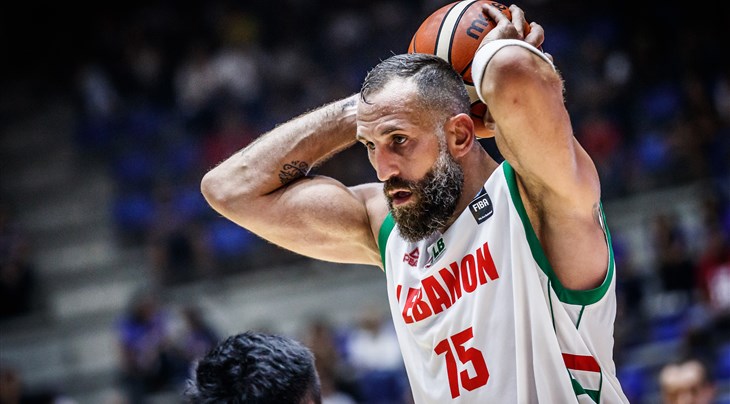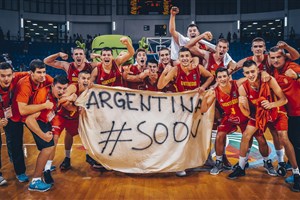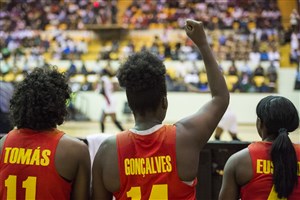
Eyes on Beirut
MELBOURNE (Paulo Kennedy’s View from Downunder) – It’s been kind of nice to see, at a FIBA Asia Cup that has very much been about teams renewing for the future, that some old stalwarts have really made their mark.
The most obvious one, of course, is home-town hero Fadi El Khatib, who really has been the undisputed star of the show, averaging 23ppg, 5.4rpg and 4apg, while shooting the ball at a pretty handy 47 per cent.
As has so often been the case in the past, how Lebanon goes depends on how El Khatib goes.
Against Korea they were +14 in their leader’s 35 minutes on court and -8 with him seated. In the loss to New Zealand those numbers were +6 in 37 minutes and -8 in three. In the quarter-final qualifier against Chinese Taipei they were +16 in 39 and -3 in one minute of rest.
Future focus
While this is a tribute to how good El Khatib has been this tournament, is it also possible his return hasn’t been good for the future of the team?
How can a line-up that showed great promise in 2015 – particularly the likes of Wael Arakji, Ali Haidar, Amir Saoud and Bassel Bawji who are all in uniform again this year – be so poor without El Khatib on the floor?
While I fully understand such a legend of Lebanese basketball coming back for a home finale, I think it will be best for the team to move on for the FIBA Basketball World Cup qualifiers, they need to build for the future around the likes of Arakji, Haidar and the next generation beyond that.
Giant strides
Hamed Haddadi is another veteran doing great things – averaging 18 points, 11 boards and a remarkable seven dimes per night – and at 32 years of age and not relying on speed of foot, you have to wonder if there are still quite a few years left in the Iranian giant.
Most Korean players have struggled against more physical opponents in my time covering Asia, their speed and skill far exceeding their toughness, and Saturday’s semi-final between the two teams will show us if this a different Korea or a reincarnation of the same old.
One thing’s for sure, they better not pay too much attention to Haddadi, because he is peeling off dimes like mandarin skin at this tournament and it has just been beautiful to watch.
All Stars
For mine, El Khatib and Haddadi are no-brainers for the All-First Team, and I think a pair of emerging stars from Oceania, Mitch Creek and Shea Ili, have certainly made a strong case to join them.
Of course, performances in the medal rounds will have a large bearing, and some other contenders include Tall Black Finn Delany, Iran’s Mohammad Jamshidi and Korea’s Kim Sunhyung ,who has taken his game to a level we haven’t seen from him before.
I imagine Terrance Romeo will be considered given some of his ridiculous offensive exploits – most notably 22 points in a quarter to keep the Philippines in their quarter-final clash with Korea – but I still think Jayson Castro is the man who drives the Gilas bus, even if his numbers have dropped.
Gilas future
It’s been an exciting few years for Philippines basketball and, through their incredible fans, that generates excitement in hoops around the globe.
Claiming second at home in the 2013 FIBA Asia Cup, running teams like Argentina and Croatia to the wire at the 2014 World Cup, picking up another Asia Cup silver medal in 2015, and then coming close to upsetting quality France and New Zealand teams in last year’s Olympic Qualifying Tournament.
Without doubt, the Gilas Pilipinas were the best-performed Asian team in that four-year block. They were a genuine threat to almost any team on almost any night.
Some of the key drivers of that success were Andray Blatche, Ranidel de Ocampo, Tab Baldwin and Castro. The first three are gone, the last one is still a great player – heart and soul – but at 31 with slowing legs isn’t going to be the answer forever.
Yes, hopefully he will still play a role through the World Cup qualifiers and lead his country to China 2019, but the Philippines desperately need a new generation to stand up, especially with Gabe Norwood heading towards his 33rd birthday.
Americans
Was it just a bad day in the quarter-finals, or do the Philippines need a quality American on-board to be a podium team? Marcus Douthit and Blatche filled that role for so long, who is next?
I am still torn about that practice, so prevalent in Asia and weaker European teams, of basically recruiting an American to strengthen their team, as opposed to playing someone who has truly adopted the country, as it obviously goes against the very idea of international competition and representing one’s home.
On the other hand, it levels out the competition – Iraq brought some genuine excitement to this tournament and that was largely thanks to Kevin Galloway who, unless my research has missed something, is about as Iraqi as the Bush family.
I think I’d like to see the criteria toughened gradually over time, so it doesn’t send some nations back two steps in a hurry, but lets them know importing Americans isn’t a sustainable practice in FIBA hoops.
Welcome back Sam
Fantastic to see Sam Daghles at the helm of Jordan, bringing his combination of passion and smarts to the sidelines now that he can no longer control games from the hardwood.
I particularly like seeing Jordan play without an import player, and while Daghles would be very disappointed with his team’s fadeout against New Zealand in Thursday’s quarter-final – and their lack of effort on the glass – overall their tournament has shown promise.
Without mainstays Daghles, Zaid Abbas or a naturalised American, they’ve compiled a 3-2 record with losses only to semi-finalists NZ and Iran.
Given Jordan finished seventh in 2013 and ninth in 2015, this top eight finish should be heralded a real success for Daghles and his men, the new boss’ next big challenge to bring the young brigade on this roster – five players 25 or younger – up to being genuine contributors sooner rather than later.
Ready to rumble
Of course, next week I’ll be writing about Saturday night’s Oceania semi-final rumble between Australia and New Zealand, and what transpires the following night as medals are decided.
It’s been great to see emerging Boomers and Tall Blacks like Jason Cadee, Creek, Matt Hodgson, Ili, Delany, Sam Timmins and Reuben Te Rangi showing Asia just how good basketball Downunder is in this tournament.
Paulo Kennedy
FIBA
FIBA's columnists write on a wide range of topics relating to basketball that are of interest to them. The opinions they express are their own and in no way reflect those of FIBA.
FIBA takes no responsibility and gives no guarantees, warranties or representations, implied or otherwise, for the content or accuracy of the content and opinion expressed in the above article.

















